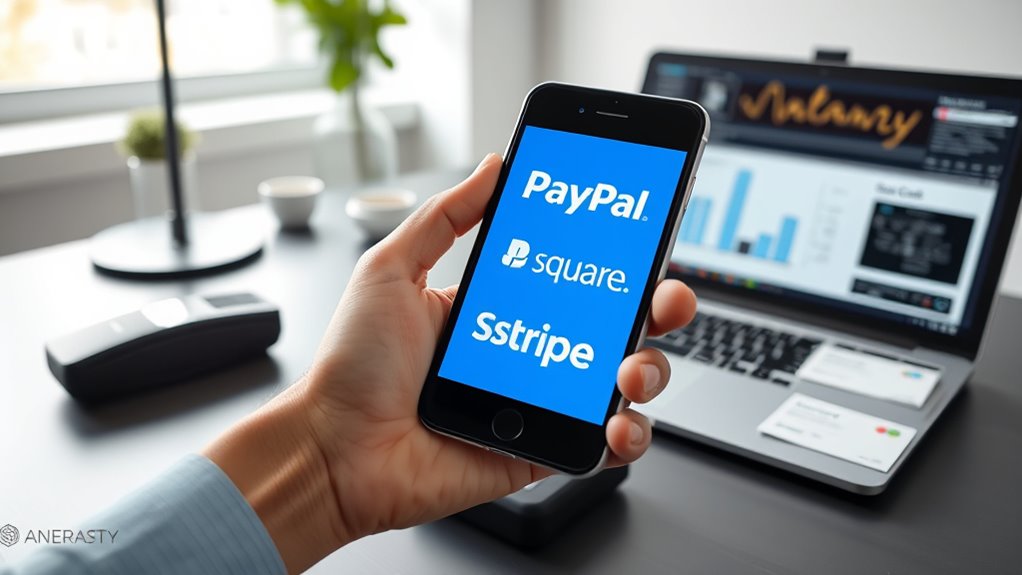Merchant aggregators like PayPal, Square, and Stripe simplify your payment process by offering a single platform to accept multiple payment types without needing individual merchant accounts. They handle technical and financial details, making setup quick and easy. With secure payment processing, fraud protection, and built-in reporting tools, you get everything you need to manage sales efficiently. Keep exploring to discover how these platforms can streamline your payments even further.
Key Takeaways
- They enable businesses to accept multiple payment methods using a single platform, reducing setup time and complexity.
- Platforms like PayPal, Square, and Stripe offer quick onboarding with minimal compliance hurdles.
- They integrate seamlessly via APIs or plugins, allowing smooth checkout experiences for customers.
- These aggregators handle transaction routing, security, and settlement, simplifying financial management for businesses.
- They provide additional features like fraud protection, detailed reporting, and support for diverse payment options.

Merchant aggregators are platforms that let your business accept multiple payment methods without the hassle of setting up individual merchant accounts. Instead of dealing with separate bank relationships and complex approval processes, you work with an intermediary that handles the technical and financial details. These platforms act as a bridge between your business, banks, and payment networks, simplifying how you process payments. This setup is especially advantageous for small to medium-sized businesses, as it reduces onboarding time and gets you up and running faster. You can accept various payment options, including credit cards, debit cards, and digital wallets, all through a single integrated platform. Most aggregators also provide tools for payment security, settlement, and detailed reporting, helping you manage your finances more efficiently.
Merchant aggregators simplify payment processing for small businesses by offering multiple payment options through a single platform.
The way payment aggregators operate is straightforward. After completing a quick application and passing some due diligence checks, you gain access to their system. They typically provide APIs or plugins that seamlessly integrate into your checkout process, making it easy for customers to pay. When a customer makes a payment, the aggregator processes the transaction by routing it through acquiring banks and card networks. Once approved, the funds are settled into the aggregator’s account, and after deducting fees, they are deposited into your business account. Settlement schedules vary but often happen daily or weekly, depending on the provider. Many aggregators also perform fraud detection and risk management to protect your business from unauthorized transactions. Incorporating comprehensive compliance measures is essential for maintaining trust and security in digital payments.
Using a merchant aggregator offers several benefits. First, you avoid the lengthy process of opening and maintaining a separate merchant account with a bank or card network. This streamlines onboarding and speeds up your ability to start accepting payments. Supporting multiple payment types also improves customer satisfaction and can lead to higher conversion rates. Security is a top priority; aggregators follow strict PCI DSS standards to protect sensitive transaction data. Additionally, they offer consolidated reporting tools that give you insights into sales trends, customer behavior, and overall performance, helping you make informed business decisions. This integration of security and data analytics provides a comprehensive view of your payment ecosystem.
While the fees are generally higher than traditional merchant accounts, they are transparent and usually based on a percentage of each transaction plus fixed charges. Many aggregators use flat-rate pricing, making costs predictable for small businesses. Keep in mind, though, that funds might be held temporarily or take longer to settle compared to direct accounts, especially during busy periods or for high-risk transactions.
Major players like PayPal, Square, and Stripe exemplify the benefits of merchant aggregators. PayPal provides instant payment acceptance with an aggregated merchant ID, making it fast to get started. Square combines payment processing with point-of-sale hardware, ideal for in-person and online selling. Stripe offers extensive API options and supports various payment methods, including subscriptions and recurring billing. All three focus on ease of use, quick onboarding, and added services like fraud detection, detailed reporting, and customer support, simplifying the entire payment process for your business.
Frequently Asked Questions
How Do Merchant Aggregators Handle International Transactions?
You might wonder how these platforms handle international transactions. They process payments in the buyer’s currency, then settle in your local currency, but fees vary. Stripe charges a small percentage plus currency conversion fees, PayPal adds extra layers, and Square often has higher rates for cross-border transactions. These aggregators simplify the process by managing currency conversion and payment methods, though costs can increase with international dealings.
What Are the Hidden Fees Associated With Using Merchant Aggregators?
You should be aware of hidden fees that can sneak in when using merchant aggregators. These include currency conversion charges, which can add up to 3.9%, and extra costs for international or specific payment methods. Additionally, chargeback fees, often higher than expected, and fees for optional services like pay-later options can increase your costs. Plus, hardware and setup fees may not be immediately obvious, impacting your overall expenses.
How Secure Are Payment Data With Paypal, Square, and Stripe?
Think of your payment data as treasure chest contents. With PayPal, Square, and Stripe, you get top-tier security, like Fort Knox. They use strict PCI compliance, encryption like AES-256, and tokenization to keep your info safe. Plus, features like fraud detection and two-factor authentication act as vigilant guards. Overall, your payment data stays well-protected, giving you peace of mind during every transaction.
Can Small Businesses Access the Same Features as Large Enterprises?
You might wonder if small businesses can access the same features as large enterprises. The answer is yes, but with some differences. Stripe offers extensive customization and scalability through APIs, suitable for any size, though small businesses need technical skills. PayPal provides easy-to-use, out-of-the-box solutions with fewer custom options. Square simplifies setup for small businesses but lacks advanced features needed for large enterprise operations.
What Is the Process for Dispute Resolution With Merchant Aggregators?
Did you know that around 65% of disputes get resolved in favor of the buyer? When a dispute arises, you get notified through your platform’s dashboard, email, or app, with details and deadlines. You can submit evidence like receipts or delivery proof to contest it. If unresolved, it escalates to an investigation where the platform or card issuer makes the final decision, often in favor of the buyer.
Conclusion
By now, you see how merchant aggregators like PayPal, Square, and Stripe make accepting payments effortless. Did you know that over 50 million businesses worldwide rely on these platforms? They simplify transactions, reduce costs, and let you focus on growing your business. Embracing these services can boost your sales and streamline your operations. So, why wait? Join millions of successful entrepreneurs who’ve already made payments easier with merchant aggregators today.









